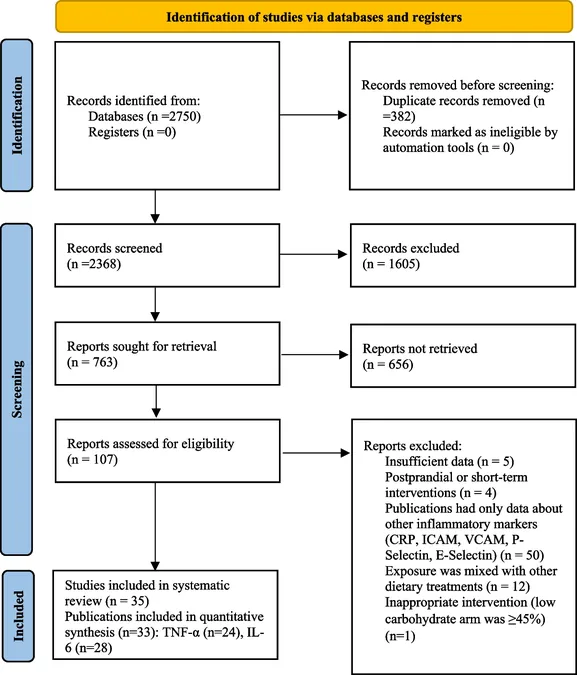
Unlocking the Mystery: Do Low-Carb Diets Actually Reduce Inflammation?
2025-04-14
Author: Wei Ling
In the quest for better health, low-carbohydrate diets (LCDs) have surged in popularity, but do they really help fight inflammation? This comprehensive review dives deep into the evidence surrounding LCDs and their effects on pro-inflammatory cytokines like TNF-α and IL-6, both linked to chronic health conditions such as heart disease and diabetes.
Inflammation: The Hidden Threat to Your Health
Inflammation is more than just a buzzword; it’s a critical mechanism tied to several chronic illnesses, including cardiovascular disease, type 2 diabetes, and metabolic syndrome. Pro-inflammatory cytokines such as TNF-α and IL-6 play significant roles in these processes, prompting researchers to explore how dietary interventions could potentially mitigate these risks.
Can Cutting Carbs Reduce Inflammation?
The premise is simple: by cutting carbs, we may impact inflammation negatively linked to obesity and insulin resistance. Studies have shown that adhering to low-carb diets not only promotes weight loss but may also lead to a decrease in cardiovascular risk factors and reduce the rates of chronic diseases.
Emerging evidence suggests that low-carb diets might change more than just waistlines; they could actively alter inflammatory markers. For instance, ketone bodies, particularly beta-hydroxybutyrate (BHB), emerge as crucial players in lowering inflammation by minimizing harmful processes in the body.
The Numbers Don't Lie: What the Research Shows
A systematic review revealed significant findings: LCDs were effective in reducing IL-6 levels but not TNF-α. Despite these promising results, the evidence's quality varied, highlighting that dietary fat sources and the intensity of carbohydrate restrictions could dramatically influence outcomes.
It’s crucial to understand that the effectiveness of these diets seems linked to the specific details of caloric intake and food sourcing. In particular, reducing carbohydrate intake to less than 10% of total calories yielded better results in managing inflammatory cytokines.
Subgroup Success: Who Benefits Most?
Subgroup analyses revealed intriguing patterns: healthy individuals with lower BMIs and patients with type 2 diabetes saw significant drops in inflammatory markers. This highlights that while LCDs might aid many, their effects could vary based on individual health circumstances and adherence to dietary protocols.
Navigating the Nutrition Landscape
However, don’t throw caution to the wind just yet! Concerns remain about the adverse impact of LCDs, particularly when they lead to high intake of animal fats or protein. The quality of dietary fats matters, and the shift in eating patterns can also lead to nutritional deficiencies.
The Bottom Line: Should You Go Low-Carb?
While LCDs show potential in managing inflammation, especially in specific populations, more research is needed to solidify these findings and understand long-term effects. Monitoring your body’s response and consulting health professionals can provide personalized strategies for managing inflammation.
In summary, while low-carb diets illuminate pathways to better health, navigating them effectively requires a nuanced approach to ensure not just short-term benefits but also long-term health safety.



 Brasil (PT)
Brasil (PT)
 Canada (EN)
Canada (EN)
 Chile (ES)
Chile (ES)
 Česko (CS)
Česko (CS)
 대한민국 (KO)
대한민국 (KO)
 España (ES)
España (ES)
 France (FR)
France (FR)
 Hong Kong (EN)
Hong Kong (EN)
 Italia (IT)
Italia (IT)
 日本 (JA)
日本 (JA)
 Magyarország (HU)
Magyarország (HU)
 Norge (NO)
Norge (NO)
 Polska (PL)
Polska (PL)
 Schweiz (DE)
Schweiz (DE)
 Singapore (EN)
Singapore (EN)
 Sverige (SV)
Sverige (SV)
 Suomi (FI)
Suomi (FI)
 Türkiye (TR)
Türkiye (TR)
 الإمارات العربية المتحدة (AR)
الإمارات العربية المتحدة (AR)